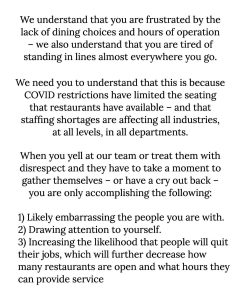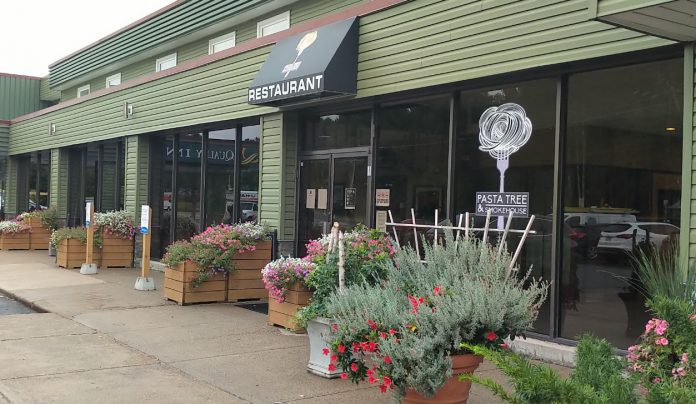Business owners and staff in Muskoka’s hospitality industry are still reeling after a busy summer plagued by staff shortages, and now they’re bracing for a similarly difficult fall season.
Restaurant after restaurant has announced reduced hours and temporary closures due to a lack of staff, and the problem isn’t just affecting food service. Other businesses like the TD Bank in Bala and Dynacare Laboratory and Health Services Centre in Bracebridge have also closed due to staff shortages, but the hospitality industry has been hit particularly hard by the shortage as well as the pandemic in general. Tanya Merton, co-owner of Touchstone Grill, said they were unable to take in their usual capacity this summer and it all comes down to a lack of staff.
“I could’ve made double or triple the amount to get us back on our feet after COVID, but I couldn’t do that with no staff,” Merton said. “My staff went above and beyond and worked seven [or] 14 days in a row, just to try and make back their money too from not being able to work for months with COVID.”
Merton points to the area’s lack of affordable housing as the primary reason behind the shortage. Muskoka is getting hammered with out-of-town visitors as more and more people are being priced out of the region, she said.
A Housing And Staffing Crisis In One
Though the housing crisis in Muskoka existed before the pandemic, COVID has put an additional strain on the issue, causing the community and the tourism industry to suffer, she said. As students leave their summer jobs and go back to school, she’s concerned about the additional stress on local businesses through the fall and winter.
“Now we’re really seeing the crunch on how many people have had to move out of Muskoka because they can’t afford it,” she said. “The bidding wars that are going on in Muskoka over buying houses, they’re paying way more than what it’s actually worth just to get out of the city and come here because they feel safer, but people that have been born and raised in this community can’t stay here. They’re being forced out.”

One solution to help address the shortage could be bringing a culinary program to Georgian College’s existing campus in Bracebridge, Merton said. People who already live in the community could study culinary arts without going to Barrie and local businesses could hire students for apprenticeships and other placements.
But more than that, she feels housing needs to be addressed. Municipalities need to work together to fix the lack of affordable housing and make use of empty units, Merton said, especially as businesses continue “screaming for staff.”
Alison Young is the restaurant chef at Riverwalk Restaurant in Bracebridge and also works alongside executive chef David Friesen at his other restaurants, Pasta Tree & Smokehouse and The Oven. They laid off 55 people at the beginning of the pandemic and now with students going back to university, they’re left with just five staff members, Young said.
The lack of kitchen staff in particular led them to open just The Oven for the summer and keep Pasta Tree & Smokehouse limited to takeout as the Riverwalk undergoes repairs. When construction is complete, however, the Riverwalk’s reopening plans will also depend on their ability to find staff.
In a recent survey from Restaurants Canada, an advocacy group representing the foodservice industry, 80 per cent of respondents said they were struggling to hire back-of-house staff and 67 per cent reported difficulties in filling front-of-house roles. Ads seeking staff for the Pasta Tree have been up for months with no results, and due to the issues with housing, they can’t source employees from outside Muskoka. The restaurant needs at least five people in the kitchen, and as it stands, they have just one.
“I’ve never seen a year like this before. Ever,” Young said. “If people want to move, there’s nowhere for them to move. We had three employees that we couldn’t hire because they couldn’t find places to live up here, and one of our employees right now got an apartment in Toronto and she’s going to be commuting.”
Hospitality Industry Braces For Fall
Though the end of summer might seem like a welcome reprieve, Young said they’re just as busy and there’s no sign of business slowing down. She’s hoping the closure of seasonal resorts as well as children returning to school will provide more options for sourcing staff as seasonal staff seek other work and parents rejoin the workforce.
Along with a shortage of back-of-house staff, the way customers have treated front-of-house employees played a role in keeping the Pasta Tree’s dining room closed for the summer. Young said it’s easier to disappoint people by having them not come in at all rather than disappoint them when they get there and have them direct that frustration at their staff.

“All of our university students came back to me and said, ‘We’ll serve if you want to,’ and we said, ‘No, we can’t open the restaurant and have you be treated the way you were treated,’” Young said. “They’ll come back next year when hopefully things are a lot better.”
Treatment of staff throughout the shortage and pandemic has been a widespread issue. Local businesses like The Oar & Paddle and Momma’s Bear Ice Cream and Sweets have put out statements asking customers to be kind to their staff, and much of the conflict has come from the enforcement of COVID restrictions and regulations.
“People did not want to abide by the government mandated rules,” Young said. “We didn’t put them in place. We found it really difficult just because customers were blaming our staff for mandating masks and things like that. It was really upsetting for us because everybody was taking out their frustrations on staff.”
A Statistics Canada study from 2018 found that the hospitality industry offered lower job quality than other industries, falling short in areas such as training opportunities, social environment, and income and benefits. Those drawbacks coupled with COVID-related grievances have led many people to leave the industry altogether.
Employment in accommodation and food services was down 18.7 per cent in July 2021 compared to February 2020, according to Statistics Canada’s Labour Force Survey. That means nearly 230,000 fewer people are working in the hospitality industry now than in the beginning of the pandemic, accounting for over one-third of the difference between current and pre-pandemic employment.
Asking For Compassion And Compliance
With proof of vaccination requirements in effect as of Sept. 22, Young and her team are terrified to enforce the mandates as protests happen at hospitals across the province. Businesses could face charges under the Reopening Ontario Act if they choose not to follow suit, and though Young supports using proof of vaccination as a way to keep people safe, the burden on her staff to implement the regulations remains a concern.
Prices could go up since businesses have to designate staff to check proof of vaccination, Young said, and the continued aggression from naysayers could push more people out of the industry. To help protect their staff, anyone who wants a reservation at The Oven going forward will have to provide their email address and agree to follow the guidelines.
“We’re going to email them our policies and procedures and we’re going to say, ‘Here they are upfront, if you choose not to abide by them, you’re more than welcome not to join us,’” Young said. “And we’ve done this for years, if anyone mistreats our employees, they’re asked to leave.”
Though increased access to housing is part of the equation, Young said the hospitality industry also needs an overhaul. Changes like increased wages and automatic gratuity could help, but more than that, she hopes there will be a major shift in respect toward servers, kitchen staff and others in hospitality.
“In every industry, people need compassion, and they need to learn that people choose to do this because they enjoy doing it,” Young said. “People serve because they like to, not because they have to nowadays, and it’s pushing people out of the industry. The lack of respect and treatment of people is crazy.”








